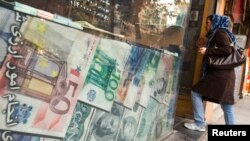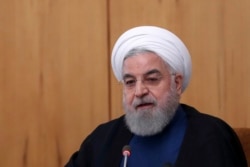A senior U.S. official says Washington's sanctions against Iran have sharply curbed Tehran's access to foreign currency, leaving it only $10 billion of accessible reserves to "foment violence and suffering" at home and abroad.
U.S. Special Representative for Iran Brian Hook shared what he said were newly declassified details of Iran's foreign exchange reserves in a speech Thursday to the Council on Foreign Relations (CFR) in Washington.
"According to U.S. government analysis, Iran currently has around $100 billion in foreign exchange reserves. Of that, only about 10% is immediately accessible to Iranian authorities. That is $10 billion," Hook said.
In a question-and-answer session after his prepared remarks, Hook said the other $90 billion in Iranian foreign currency is "locked up" by other nations, much of it in escrow accounts that those nations have barred Iran from accessing because of unilateral U.S. sanctions on the Iranian financial system. Many international companies and banks have refused to engage in transactions with Iran for fear of being subjected to secondary U.S. sanctions that would cut them off from U.S. financial markets.
A statistical appendix to an International Monetary Fund economic report on the Middle East and Central Asia shows Iran's gross official foreign exchange reserves were $101 billion in 2018, with a projected decrease to $85 billion in 2019 and $68 billion in 2020.
Hook said Iran's total foreign currency reserves also are in decline because U.S. sanctions have choked off its exports. Before the U.S. began its campaign of tougher sanctions on Iran last year, Hook said, Tehran relied on oil exports for around 50% of its foreign currency earnings, with much of the remainder coming from exports of petrochemicals, metals and refined petroleum products. The Trump administration has sanctioned all of these exports since last year.
"The regime is struggling to acquire the foreign currency they need to procure imports such as machinery, industrial inputs and consumer goods," Hook said. "Given the current sanctions on all of Iran's top revenue generating exports, this is simply not sustainable for the regime."
Hook pointed to Iran's foreign currency woes as evidence of the success of the U.S. campaign to pressure Iran economically and diplomatically to stop perceived malign behaviors.
The Trump administration has said its campaign also is aimed at pressing Iran's Islamist rulers to negotiate a new deal to replace a 2015 agreement they reached with world powers. President Donald Trump withdrew from that deal last year, saying it was not tough enough on Tehran.
"Iran's fully accessible foreign exchange reserves are scraping the bottom of the barrel as the regime heads to a severe balance of payments crisis," Mark Dubowitz, chief executive of the Foundation for Defense of Democracies (FDD) and advocate of tougher U.S. pressure on Tehran, said in a message to VOA Persian.
"To fully turn the screws, the U.S. needs to make the rest of the funds, particularly in the oil escrow accounts, only available for humanitarian purchases, while sanctioning the entirety of Iranian Supreme Leader Ayatollah Ali Khamenei's off-the-books corporate empire," Dubowitz said.
FDD has estimated that Khamenei controls at least $200 billion of assets through three tax-exempt foundations.
Ali Vaez, an International Crisis Group analyst and critic of the U.S. pressure campaign on Iran, disputed Hook’s contention that Tehran’s reduced access to foreign exchange is a U.S. policy success.
"An Iranian government that has increasingly less to lose and less to fear, given the Trump administration's demonstrated reluctance to use force, is likely to become more, not less, aggressive in the region and repressive at home," Vaez told VOA Persian.
President Trump has not responded militarily to Iran’s shoot-down of a U.S. drone flying over the Persian Gulf in June or other attacks the U.S. has accused Iran of carrying out this year against oil tankers in the region and oil facilities in Saudi Arabia, a regional ally. Iran has denied involvement in those other incidents.
"To some extent, Iran is trying to bait the United States into a military conflict," Hook told the CFR gathering. "If we are attacked, we will respond with military force. I can assure you the last thing the United States is looking for is conflict in the Middle East. We have had more than enough of it."
U.S. economist Steve Hanke of Johns Hopkins University, another critic of U.S. sanctions on Iran, said that while hurting the Iranian economy, they also have caused the government to dig in.
"A country targeted by sanctions finds illicit ways to get around the problems," Hanke said. "Sanctions fuel international criminality. They don't defeat an enemy — they create opportunities for bad people to do bad things."
Earlier this week, Iranian President Hassan Rouhani unveiled a new budget that he said would help Iran to resist U.S. sanctions by making its economy less dependent on oil revenue next year. He also said Iran will benefit from a $5 billion Russian loan that he said was being finalized.
Hook dismissed Iran's draft budget as unrealistic for predicting that its oil exports, which typically comprise at least 30% of government revenue, will average about 1 million barrels per day. He said the Trump administration estimated Iran's oil exports plunged to just 100,000 barrels per day in August.
"Due to the staggering loss of oil revenue, it is nearly impossible for the regime to put a credible budget forward," Hook said.
This article originated in VOA's Persian Service.







